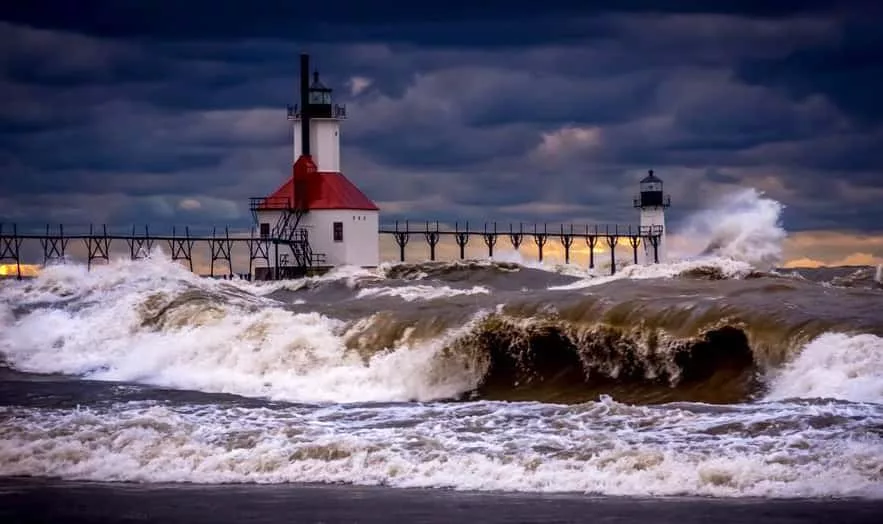If it seems to you that the frequency and ferocity of storms along the Lake Michigan shoreline appear to be on the rise, a new report suggests it’s very well not just your imagination. A report released this week in Chicago commissioned by the Environmental Law & Policy Center is a real eye-opener. The opening words of the executive summary spell it out:
Climate change is causing significant and far-reaching impacts on the Great Lakes and the Great Lakes region. In recent years, our planet has experienced some of the warmest temperatures ever recorded, record-breaking weather extremes, powerful storms, increasing tragic flooding from rising sea levels and associated storm surge, huge wildfires, and continued melting of glaciers and polar sea ice. The accelerating pattern of changes in the Earth’s climate is affecting the Great Lakes.
The new report was produced by a team of 18 leading scientists and experts from Midwest and Canadian universities and research institutions, and it draws on the array of existing research to assess how the shifting global climate is impacting the unique Great Lakes region.
The report shares the enormous impact, both seen and unseen, on the more than 34-million people who live here. Those are the people who rely on the freshwater lakes for drinking water, fisheries, and recreation, not to mention commerce and industry alike.
The lakes actually contain 5,500 cubic miles of freshwater…fully 21-percent of the world’s fresh water…one of the largest such freshwater resources on the globe. Additionally, the report reminds us that the Great Lakes support one of the world’s largest regional economies similar to those of entire developed nations. We’ve all heard, in the battle over the Asian Carp, that the regional fisheries alone represent a $7-billion a year industry and tourism generates $16-billion more.
Even the executive summary doesn’t wait long to jump into the role we, as humans, have in this equation, noting: “Heavy human use over the past two centuries has taken its toll in the forms of habitat loss and fragmentation, influxes of invasive species, and polluted air, water, and sediments. Soil and nutrient runoff from agricultural fields and concentrated animal feedlot operations (CAFOs) imperil water quality and wildlife populations in many parts of the basin, threatening public and wildlife health and the economic vitality of the region. Climatic changes now underway further stress these ecosystems, alternatively raising and lowering lake levels and threatening the region in new ways.”
Even casual observers will recognize that, as the report reminds us, “Heat waves have become more common since the 1960s, while extreme cold temperatures have generally decreased. Intense summer storms occur more often as temperatures rise.” It goes on to delve into the impact, saying, “Extreme weather events have already taken their toll on the Midwest. The 2012 Midwestern heat wave and drought caused more than $30-billion in economic damage, 123 deaths, and harmful long-term health impacts across most of the central and western United States.”
The in-depth report offers up more bad news for shoreline property owners saying that the shore, including beaches and dunes will experience further erosion from heavier rainfalls. In fact, while annual U.S. precipitation was up by 4-percent between 1901 and 2015, it skyrocketed by nearly 10-percent throughout the Great Lakes region, often driven by atypical big storms.
The summary shares the following conclusion:
We should not and cannot take the vast natural resources of the Great Lakes for granted. Allowing the Great Lakes to be degraded through human activities, including climate change, is not an option. For economic, aesthetic, recreational, and ecological reasons, the Great Lakes should be restored to be healthy, unpolluted, and productive. We must reduce the effects of climate change on the Great Lakes.
Public support for protecting the Great Lakes is strong across the region. Scientific analyses clearly show that climate change has already greatly affected the region and that these impacts will continue and expand as the pace of climate change accelerates. It is critical that we recognize the importance of one of the world’s most abundant freshwater resources and ensure its protection for generations to come.
The full 74-page report and 5-page executive summary can be viewed at the links below:
For the summary: Great-Lakes-Climate-Change-Report_ExecutiveSummary-1
For the complete report: Great-Lakes-Climate-Change-Report
The Environmental Law & Policy Center of the Midwest was founded in 1993 and is a leading public interest environmental legal advocacy and eco-business innovation organization. They develop and lead successful strategic advocacy campaigns to improve environmental quality and protect our natural resources. They are public interest environmental entrepreneurs who engage in creative business dealmaking with diverse interests to put into practice their belief that environmental progress and economic development can be achieved together. ELPC’s multidisciplinary staff of talented and experienced public interest attorneys, environmental business specialists, public policy advocates and communications specialists brings a strong and effective combination of skills to solve environmental problems.
ELPC’s vision embraces both smart, persuasive advocacy and sustainable development principles to win the most important environmental cases and create positive solutions to protect the environment. ELPC’s teamwork approach uses legal, economic, scientific and public policy analysis, and communications advocacy tools to produce successes. ELPC’s strategic advocacy and business dealmaking involves “proposing solutions when we oppose threats to the Midwest environment. We say ‘yes’ to better solutions; we don’t just say ‘no.’”
The photo of an October 2017 storm over Lake Michigan at St. Joseph accompanying this story on Moody on the Market is courtesy of Berrien Springs photographer Molly Shuler Pate.






